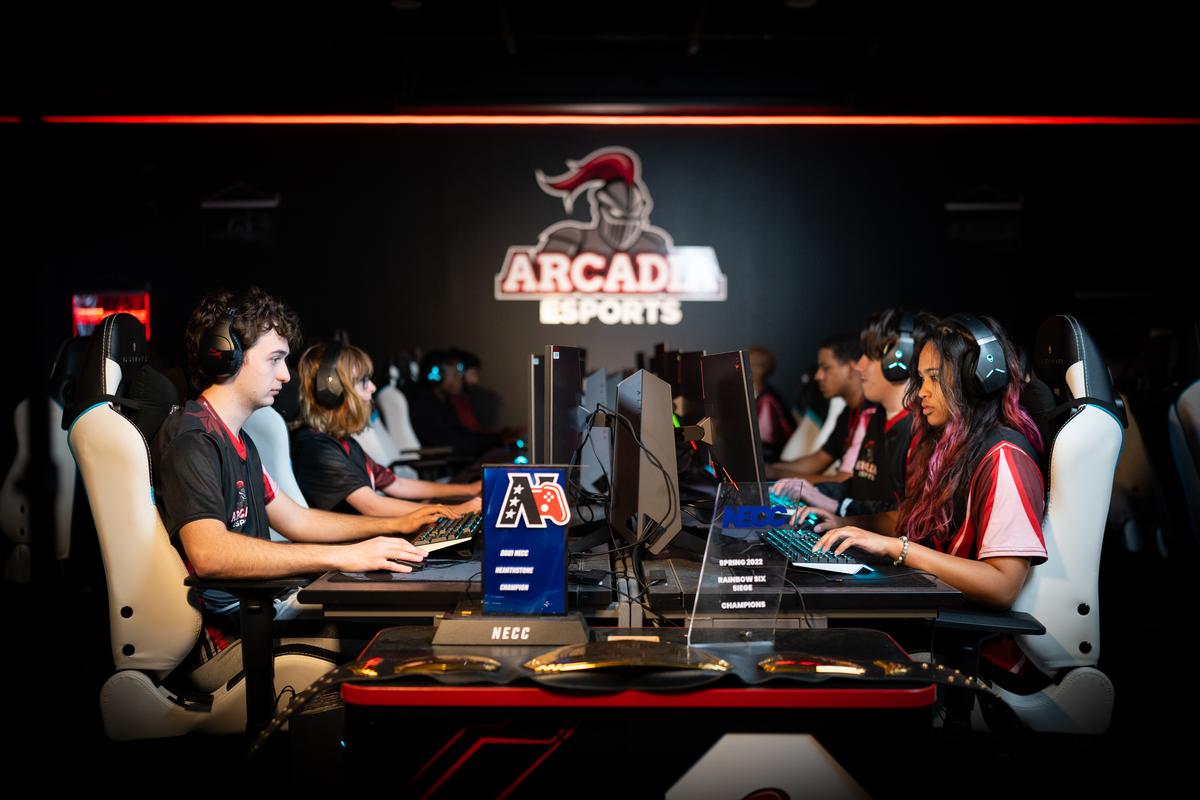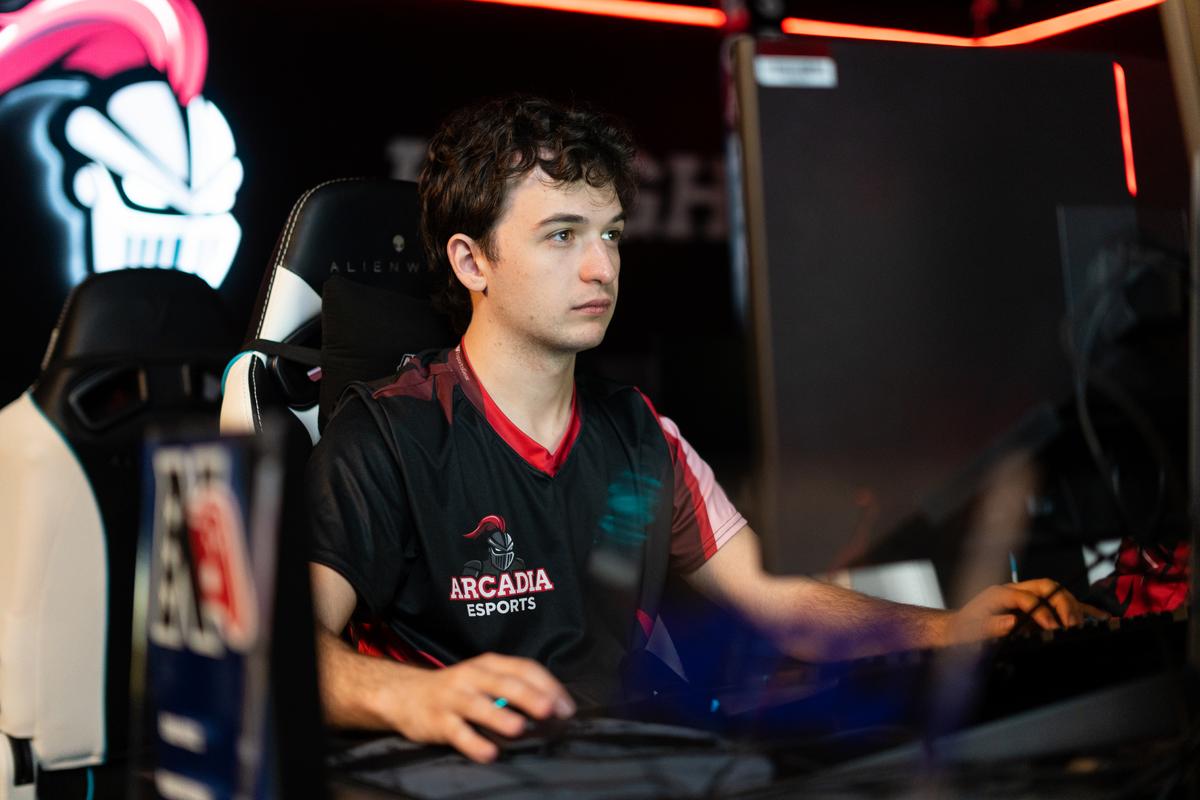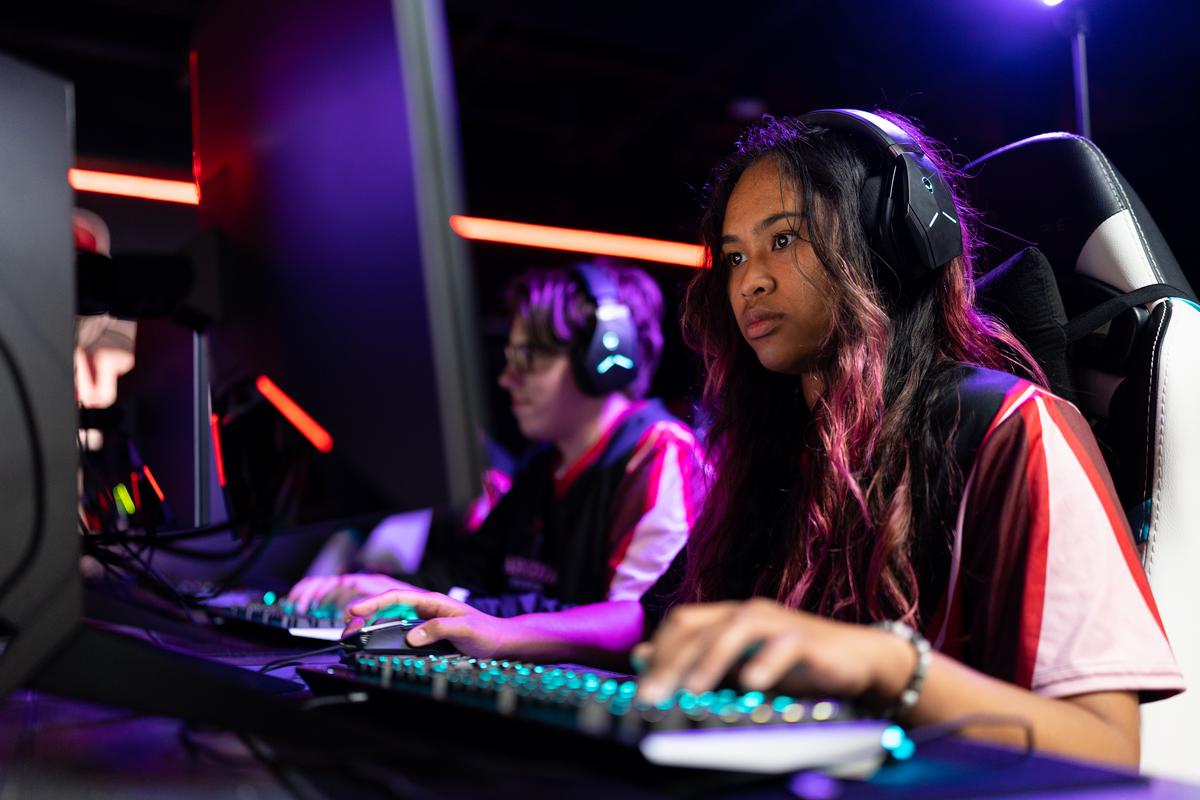Arcadia Magazine Summer 2023: Not Your Parents’ Video Games

Collegiate esports programs are as intense and serious as other athletics programs — and perhaps more inclusive.
The first time Patrick McCool ’23 saw the esports arena on Arcadia University’s campus, boxes of expensive equipment were spread across half of the room and a mere single row of computers had been set up.
McCool, who had just arrived on campus for his first year, had responded to a University-wide email encouraging students to join the fledgling Electronic Sports (Esports) program. Four years later, the program has won several conference championships, has approximately 50 student-athletes, routinely entices top high school players to commit to Arcadia, and has an arena that’s one of the finest in the region.
“This program has come a long way in the last four years,” said McCool, who earned a degree in Computer Science. “You wonder, ‘’How do you create a video game-based team?’ It’s not like it’s a swim team or a basketball team that has practiced together for a long time; everyone was coming from computers or consoles in their bedrooms.”

A Different Kind of Program
Esports are a form of video game playing in which teams compete in a variety of genres, including multiplayer online battle arenas, real-time strategy, sports, and more.
An Esports program, however, isn’t constructed like other collegiate athletic programs. Instead of all the student-athletes pulling in one direction to win a specific game, they are broken up into different teams that compete separately. Esports also is a program that encourages inclusivity, perhaps breaking a long-conceived notion that university athletics are relegated to the genetically or physically blessed.
Arcadia competes in the Appalachian and NECC conferences in Overwatch, Valorant, Rocket League, Hearthstone, Super Smash Bros, and more. Each game has its own Arcadia team. Each team has its own coach.
In its four years of existence, the program collectively has won the Spring 2021 NECC Division Championship for Hearthstone, the Spring 2022 NECC Division Championship for Siege, and the Appalachian Invitational Championship for Rocket League.
“We’re many different teams, but we’re all esports,” said Karah Daniels ’26, an Education major who was recruited to the program after playing on the Esports team at her high school in Cape May County, New Jersey. “I was recruited for Overwatch and am part of that team, but I also have an interest in Smash Bros. We can switch teams or be a backup for another team, we just have to coordinate that with the coaches and the other players.”
The Beginning
Tim Belloff, director of Information Technology Support Services at Arcadia, had long thought Arcadia should have an esports program. When he approached the University’s Athletic Director, Brian Granata, Granata said he had already done some research on the sport.
“We assembled an interest group of faculty, students, staff, and alumni to talk about the program, what games we could incorporate, what the arena should look like, and a lot more,” Belloff said. “We got together and came up with some founding principles. We also met with other schools about what their investments were and what they thought was the best course of action.”
Belloff became the first director of the program, a part-time position he held on top of his full time job at Arcadia, and worked with the interest group in launching and advertising the program.
First, they solidified their space, coaches, and equipment. That was the easy part. Forming teams — and quickly — promised to be more difficult.
“At first, recruiting was difficult because none of us had ever recruited for an athletic program before,” Belloff said. “We initially were pulling students to fill out the roster, but knew that we had to recruit heavily to make it a viable program.”
The recruiting grew rapidly over four years. Now, the program consists of male and female student-athletes who are on scholarship and those who walked onto the team once they arrived on campus.
One of the recruited players, Karah Daniels, was recruited by several esports programs around the country, including one as far as Texas. She said she chose Arcadia because of the arena, because they took the sport seriously, because there are scholarship opportunities, and because it’s not too far from home.
“The [former] director, Bill Rodgers, messaged me after a LAN (Local Area Network) competition where he saw me play,” said Daniels. “He talked to me about the program and the opportunities. I came here to visit and just loved the arena and the whole look of the campus. It’s so welcoming, and I feel like Arcadia takes their Esports program more seriously than other schools that were recruiting me.”
Rodgers, who helped grow the program as assistant coach and then director, left Arcadia in the Spring semester.
In May, the Arcadia University Department of Athletics and Recreation announced the hiring of Nick Alverson as the new Director of Esports. Alverson comes to Glenside after serving as the Head Esports Coach at University of Pikeville in Kentucky for the past three years.
Not Your Typical Student Athlete
For some student-athletes, being a part of the esports team was something they strived for when choosing a college or university. Others didn’t think about being part of a college sports program until they arrived on campus.
“I think the big thing was getting into a routine and becoming competitive,” said McCool.
That competitiveness comes from a relentless routine of organized practice as well individual practices. For example, Daniels said she spends five days a week playing Overwatch in the arena. Three of the days are for practice, two of the days are for competition. However, she watches the arena as part of a work-study program, so she plays while doing that, and practices at home as well.
The same thing is true for Annaliese Williams ’26, a Psychology major who participates on the Valorant team; Cole Baugh ‘24, a Computer Science major and member of the Overwatch team; and Diego McLendon ‘26, a Chemistry/Pre-PT major and member of the Super Smash Ultimate team.
“I’m here any time throughout the day that I don’t have class,” McLendon said. “I learned about the program when I visited on Scarlet & Grey Day and I was sold immediately. I love the arena, I love playing the games, I love getting better, and I just want to be here and keep working on my game.”
For Williams, the competitive nature of the sport is what drew her to the program at Arcadia.
“I was always interested in video games and finally got myself a gaming laptop in high school,” Williams said. “I immediately got really competitive with it and knew I wanted to join the program when I came to Arcadia. I just love competing.”

For Baugh, the training and conditioning is vital for him; as the tank commander on Overwatch, he is the in-game leader. This means he coordinates and directs the team’s strategy, alerting people when to strike, when to move in, and where they should be.
“It’s a lot of work and takes a lot of practice,” said Baugh. “I transferred here from Montgomery County Community College, and one of the big reasons is because of how seriously the players and university take esports here. I get in the arena as much as possible.
“The games can change or be updated, so we always have to be ready to adapt,” he added. “It’s not like other sports where the game always stays basically the same no matter what level you are on. Here, they can change or update everything about the games, so we always have to be practicing and preparing for it.”
Growing Into Champions
This spring, the program captured the conference championship in Rocket League and finished as the conference runner-up in Overwatch.
That’s on top of several conference championships the program has captured since its inception four years ago.
McCool said he believes one of the reasons the program grew so quickly is because they stayed organized and together during the pandemic. He credits the program’s coaches and the cohesive nature of the student-athletes with keeping the teams together.
“We’re now all back together and the program is really strong,” McCool said. “I’m part of the first generation of students who started with the program and graduated playing all four years. I’ve loved my time here and am looking forward to seeing what the team accomplishes in the future.”
Belloff, who is still an unpaid adviser with the program, said he expects the sport to keep growing.
“On a collegiate level, this is definitely going to get bigger because it allows for more students to come to college and showcase their talents,” he said. “I’m really proud of what the program has accomplished and all the hard work that has been put into it. It’s turning out to be a great investment.”


